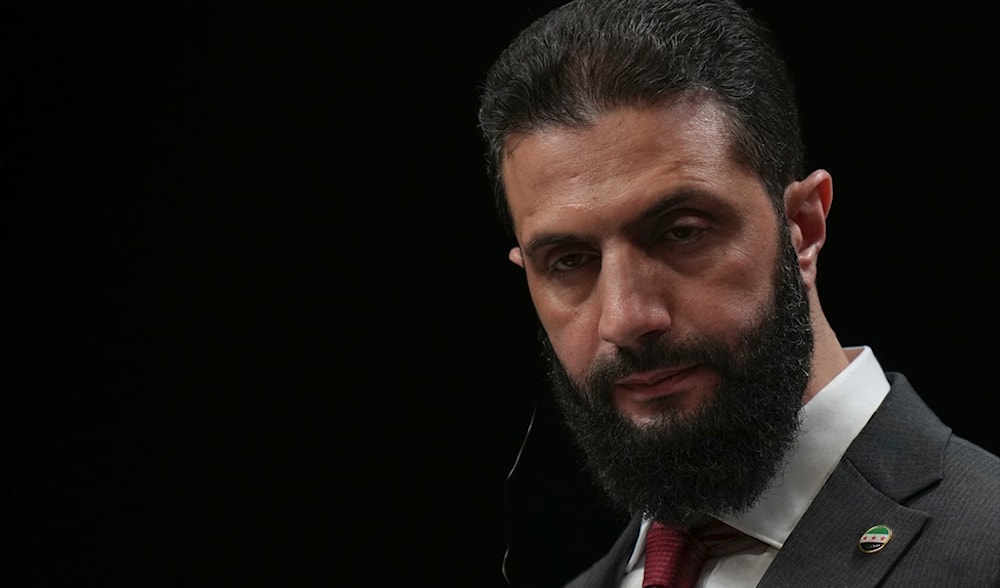Syria's Ahmad al-Sharaa announces formation of new government
Ahmad al-Sharaa has announced the formation of a new Syrian government, whose main objectives are combating corruption and promoting unity.
-

Syria's interim President Ahmad al-Sharaa, during a joint press conference with Turkish President Recep Tayyip Erdogan, following their meeting at the presidential palace in Ankara, Turkiye, on Tuesday, February 4, 2025. (AP)
Syrian President Ahmad al-Sharaa announced on Saturday the beginning of a new phase in the country's path, emphasizing that the newly formed government reflects "a shared commitment to building a new state, with a focus on unity and solidarity in the face of national challenges."
Al-Sharaa stated that the government's future plan will focus on key priorities, including preserving and developing human resources while seeking to attract skilled Syrian professionals who have left the country. He affirmed his commitment to working closely with citizens to build a bright future and establish state institutions based on transparency and accountability.
He also highlighted the creation of a dedicated ministry for Sports and Youth, recognizing the crucial role of the Syrian youth in shaping the future, further stressing the importance of energy sector reforms to ensure sustainability and round-the-clock electricity supply, in addition to supporting farmers to maintain food security.
Regarding education and healthcare, al-Sharaa pledged that the government would introduce new opportunities in these sectors, claiming that fighting corruption would be a top priority.
He also announced the establishment of a Ministry of Emergency and Disaster Management to address future challenges, which would ensure a rapid and effective response to various emergencies, whether natural or humanitarian, to protect citizens and provide immediate relief.
Speaking from the People's Palace, the Syrian president stated that special attention would be given to technological advancements, artificial intelligence programs, and digital transformation. He emphasized plans to develop the necessary infrastructure, including training specialists, attracting experts, and setting up research centers and an encouraging market for technological progress.
Al-Sharaa claimed his administration was a "government of change and development" committed to carrying the people's aspirations and hopes for a bright and sustainable future, expressing confidence that hard work, dedication, and national unity would be the key to achieving these goals.
He concluded his speech with a call for collective efforts, saying, "Let us work hand in hand for the Syria we deserve—a Syria that will always be the heart of Arabism and its bright face in the world."
Syria's constitutional declaration risks endangering rights: HRW
It is worth noting that Syria’s newly approved constitutional declaration, intended to guide the country’s transition, centralizes power within the executive branch and risks compromising judicial independence, Human Rights Watch warned on Wednesday.
Endorsed by al-Sharaa on March 13, 2025, the declaration grants the president sweeping control over judicial and legislative appointments without oversight. This raises serious concerns about the rule of law and human rights protection unless proper safeguards are implemented. The declaration frames these extensive powers as essential for managing Syria’s transitional period.
“Without stronger safeguards and independent oversight, this declaration risks consolidating executive control at the expense of fundamental freedoms at a crucial time for Syria’s future,” said Adam Coogle, deputy Middle East director at Human Rights Watch.
“Given the rampant unchecked authority of the previous government, it is paramount for Syria to establish a system that holds everyone accountable for their abuses and crimes.”
Despite claiming judicial independence, the declaration lacks safeguards. Article 47 grants the president unchecked power to appoint all seven Higher Constitutional Court members, raising concerns about accountability without independent oversight. This provision could increase the president’s control over constitutional interpretation, bypassing parliamentary input and making the judiciary vulnerable to political influence.
The declaration gives the president extensive control over legislative appointments, with one-third of the transitional parliament appointed by him and the rest by a president-selected committee. Though it includes provisions for justice and human rights, their effectiveness remains uncertain without independent oversight.
Read more: 72 killed in Syria in 24 hours amid rising assassinations

 4 Min Read
4 Min Read








